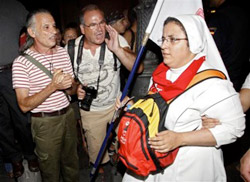 |
| Photo credit: Juan Medina/Reuters |
From Saturday into Sunday of this week I camped out at Cuatro Vientos airfield outside Madrid, joining over a million people for the open-air mass that brought World Youth Day to a crescendo. We braved tent-crushing winds and rain, overcrowded latrines, and the simple fact of incredible population density in order to celebrate our faith in union with the Pope.
I have never been in the (frightening) midst of over a million people. It makes perfectly clear how vast the Catholic world really is, and how utterly compelling is the vision of the world proposed by the Church in its reflection on Jesus' teachings. This gathering represented a particularly zealous group of young people, who themselves are a fraction of those who share the faith of the Church. Those who lament the future of the Catholic Church are those, I suspect, who have never been to World Youth Day.
Why such passion? The presence of these young people flies in the face of those cultural critics who have espoused the theories of certain masters of suspicion, including Karl Marx, Friedrich Nietzsche, Sigmund Freud, and others. According to these endarkened theorists, people are supposed to slough off the trappings of medieval superstition; they are supposed to grow up and see talk of God as posturing for political power; they are supposed to sneer at fictive talk of purity, chastity, and a desire for holiness.
But they are only theorists. And no theorist can make a million young people, filled with joy and freedom, pack an airfield out of a simple desire to share faith with others like them.
Of course there are those frightening images of the sons of the masters of suspicion, shrieking to throngs compelled by the greater forces of the Gestapo, the Party, or the tyranny of their own unreflective lusts. Yet no one, even today, can theorize his way into the hearts of young people the way that the Vicar of Christ can. What the armchair cynic does not realize is that in this communication age you can fool people only so long, but the often broken, deeply sinful, pilgrim church is still rooted in something deep and true and lasting. It's really not about the pope; it's about the fact that the pope is a symbol of the reality that Jesus changes people's lives for the better.
There is a parable about the monkey who sees a banana in a jar and who reaches in to grab the banana. But in grabbing it, his fist is too large to fit back through the mouth of the jar, and so he dies of starvation before letting go of the banana. What we have seen over the past century and a half is a massive case of cultural refusal to let go of its cherished bananas. It takes faith to relinquish what appears to bring happiness, whether it is entertainment sex, or money, or political power, or self-image. The masters of suspicion are seen by many as saviors, messiahs, helping people see through the veneer of Catholic religion. What has given them authority over the past century and a half—an authority which wanes with each passing generation—is the fact that they seem to have something right.
Ah yes, rich people have mistreated the poor: Marx was right. But Jesus was more right: the answer is not revolution, but conversion and solidarity. The answer is not creating a government that takes money from the rich and gives it to the poor; the sustainable answer is voluntary poverty and a sharing of resources out of love.
Ah yes, people have wielded the name of God like a hammer: Nietzsche was right. But Jesus was more right: this truth does not change the fact that those who reach out to God out of a great and holy desire will find him waiting with open arms. Political religion can be toxic, but prayer is the key to discerning meaning in life, and the key to building a truly loving and just world.
Ah yes, people secretly like their sex: the Victorians were hypocrites and Freud was right. But Jesus was more right: sex is a great desire which we can use to consume people or enter into communion with them. What is inconceivable to many today—that one can integrate one's sexuality into a good and holy life without being compulsive about it—is obvious to those who have learned to bring their sexuality into prayer.
The pope has risen above the masters of suspicion, because he tells the truth and the youth of World Youth Day love him for it. But the pope will be the first to tell you that it really isn't a cult of personality: he is painfully aware of his own personal limitations. Rather, it is about the fact that these young people see the masters of suspicion for what they are: recent theorists whose theories have been tried and found deeply wanting. And they find in an ancient source, an ancient Church, a wellspring of a deeper and more lasting truth. The words of Jesus are piercingly, counter-culturally, trans-historically true.
The youth are not afraid to tell you so. They are changing the world.
8/22/2011 4:00:00 AM





